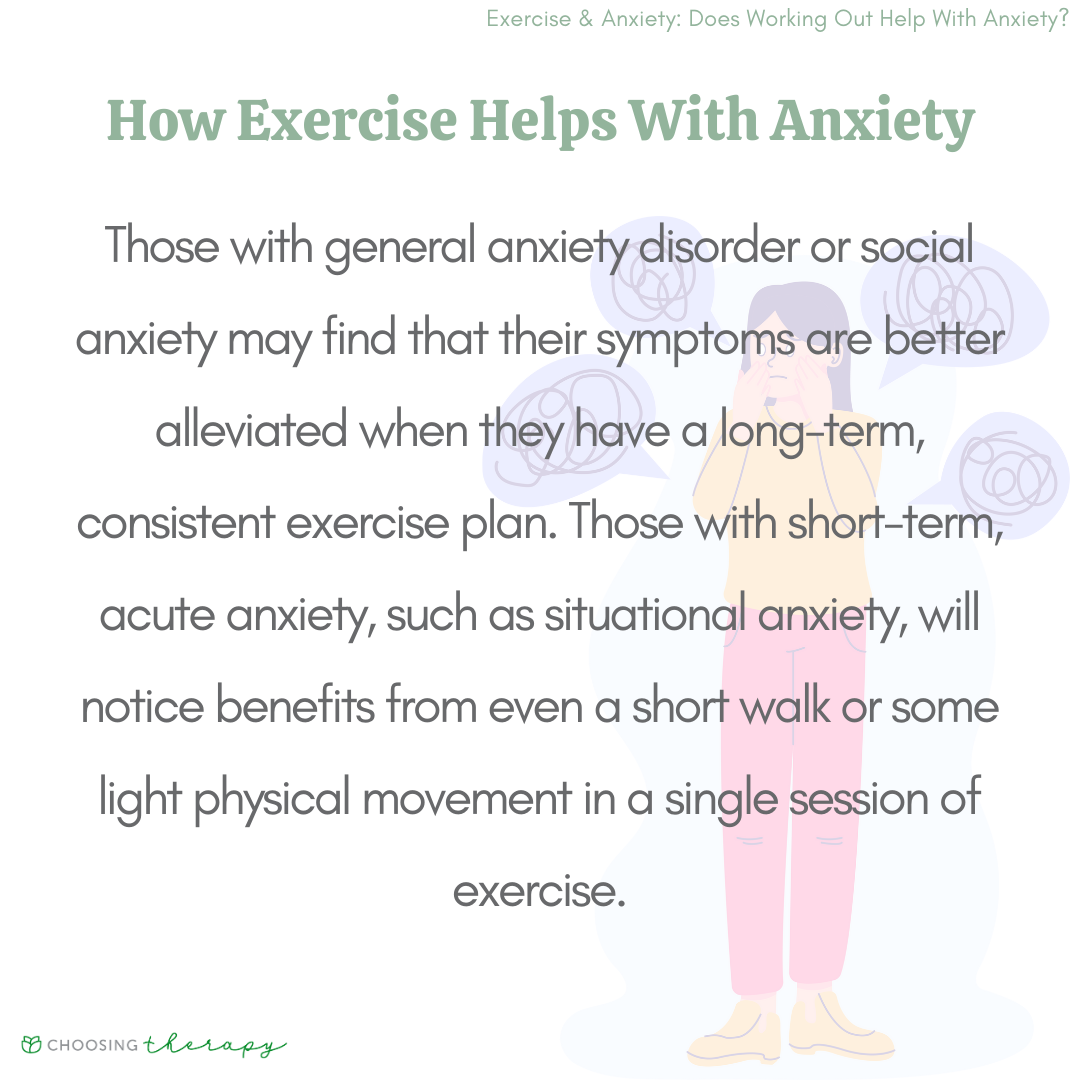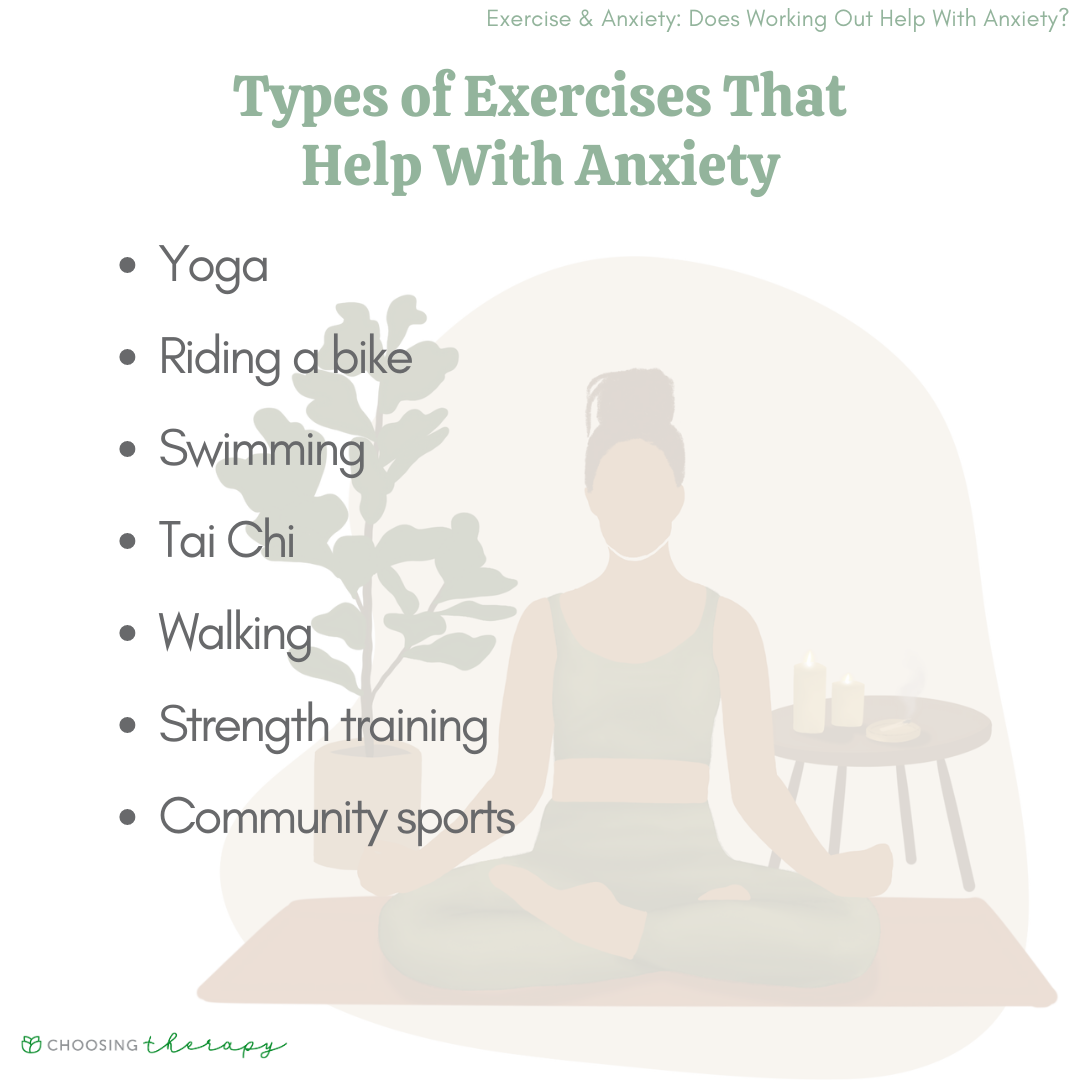Feeling anxious can be overwhelming, and you might be searching for a way to find relief. Have you ever wondered if exercise could be the key to easing your anxiety?
You’re not alone. Many people struggle with anxious thoughts and wonder if moving their body can actually help calm their mind. You’ll discover how exercise affects anxiety, why it might work for you, and simple steps to get started. Keep reading—your peace of mind could be just a few moves away.

Credit: www.choosingtherapy.com
Exercise And Anxiety Link
Exercise plays a powerful role in managing anxiety. Many people notice less worry and stress after physical activity. Understanding how exercise connects to anxiety can help you feel better. The link between exercise and anxiety involves changes in the brain and body. These changes reduce feelings of nervousness and tension. Regular exercise creates a natural way to calm the mind and improve mood.
How Exercise Affects The Brain
Exercise triggers the release of chemicals that lift mood. Endorphins, often called “feel-good” hormones, increase during activity. These chemicals help reduce pain and boost happiness. Exercise also lowers the stress hormone cortisol. Lower cortisol means less tension and anxiety. Physical activity improves sleep, which affects anxiety levels. Better sleep helps the brain handle stress more easily. Exercise also helps brain areas that control emotions work better. This leads to clearer thinking and less worry.
Types Of Anxiety Reduced By Exercise
Exercise helps many kinds of anxiety disorders. Generalized anxiety disorder symptoms often improve with regular activity. Panic attacks can become less frequent and less severe. Social anxiety symptoms also decrease with exercise. People feel more confident and relaxed in social settings. Exercise eases symptoms of post-traumatic stress disorder (PTSD) too. Even mild anxiety or stress can lessen after moving the body. Consistent exercise creates long-term benefits for all anxiety types.
Best Exercises For Anxiety
Exercise helps reduce anxiety by calming the mind and body. The right activities can lower stress and boost mood. Some exercises work better for anxiety than others. Choose workouts that relax you and feel good.
Here are some of the best exercises to ease anxiety and improve mental health.
Cardio Workouts
Cardio exercises increase your heart rate and release feel-good chemicals. Running, walking, cycling, or swimming are great choices. These workouts help clear your mind and lower tension. Regular cardio can improve sleep and reduce worry.
Yoga And Mindfulness
Yoga combines gentle movement with deep breathing. It helps you focus on the present moment. This practice reduces stress and calms anxious thoughts. Mindfulness during yoga brings peace and improves mood. Even short sessions can make a big difference.
Strength Training Benefits
Strength training builds muscle and improves confidence. Lifting weights or using resistance bands can ease anxiety. This exercise type releases tension from the body. It also boosts energy and helps you feel stronger mentally.
Quick Stress-relief Techniques
Quick stress-relief techniques can help calm your mind fast. These methods reduce anxiety and improve mood. You can do them almost anywhere. They work well during or after exercise. Let’s explore some simple ways to ease stress quickly.
Breathing Exercises During Workouts
Deep breathing helps lower tension and clear your thoughts. Try taking slow, deep breaths while exercising. Inhale through your nose for four seconds. Hold your breath for a moment. Exhale slowly through your mouth for six seconds. Repeat this pattern to feel more relaxed and focused.
Short High-intensity Sessions
Short bursts of intense exercise release stress-fighting chemicals in your brain. Exercises like jumping jacks or sprinting for 30 seconds can boost energy. These quick sessions raise your heart rate and lift your mood. They also help you feel less anxious in minutes.
Stretching And Relaxation Moves
Stretching slows your body and calms your mind. Simple stretches like reaching for your toes or side bends ease muscle tension. Try gentle yoga poses to relax after workouts. These moves improve blood flow and reduce stress quickly.

Credit: www.calmclinic.com
Creating An Anxiety-reducing Routine
Creating an anxiety-reducing routine through exercise can help calm the mind. A steady plan helps the body and brain work together. Small steps build good habits that ease stress over time.
This routine needs care and thought. It should fit your lifestyle and not cause more worry. Focus on what feels doable and enjoyable.
Setting Realistic Goals
Start with small, clear goals. Try 10 minutes of walking or stretching each day. Goals that are easy to reach keep you motivated. Avoid setting goals that feel too hard or fast. Realistic goals reduce pressure and help you stick with exercise.
Consistency Over Intensity
Regular exercise beats rare, intense workouts. A short daily routine works better than long sessions once a week. Consistency builds a habit that lowers anxiety. Easy activities like walking or yoga calm the mind without stress.
Tracking Progress And Mood
Write down your exercise and feelings each day. Note what helps and what feels hard. Tracking shows progress and mood changes over time. Seeing small wins boosts confidence. Adjust your routine based on your notes to feel better.
Additional Lifestyle Tips
Exercise helps reduce anxiety, but other lifestyle habits also matter. Small changes in daily routines can improve mental health. These tips support exercise benefits and lower anxiety levels.
Nutrition And Hydration
Eating well affects mood and energy. Choose whole foods like fruits, vegetables, and grains. Avoid too much sugar and caffeine. Drinking enough water keeps the brain working well. Dehydration can make anxiety worse. Healthy eating and hydration help exercise work better for anxiety.
Sleep’s Role In Anxiety
Good sleep is key to feeling calm. Lack of sleep can increase anxious thoughts. Aim for 7 to 9 hours each night. Create a quiet, dark, and cool room. Avoid screens before bedtime. Rested minds handle stress and exercise stress better.
Social Support And Exercise
Being around others lowers anxiety. Join group exercises or sports for company. Friends can motivate and cheer you on. Sharing feelings with others reduces stress. Social support makes exercise more fun and less lonely.

Credit: www.choosingtherapy.com
Frequently Asked Questions
Can Exercise Reduce Anxiety Symptoms Effectively?
Yes, regular exercise helps reduce anxiety by releasing feel-good hormones. It lowers stress levels and improves mood naturally over time.
What Types Of Exercise Best Relieve Anxiety?
Aerobic exercises like running, swimming, and cycling are most effective. Yoga and strength training also help relax the mind and body.
How Often Should I Exercise To Ease Anxiety?
Aim for at least 30 minutes of moderate exercise, five days a week. Consistency is key for long-term anxiety relief.
Can Exercise Replace Anxiety Medication?
Exercise can complement but not fully replace medication. Consult a doctor before changing any prescribed treatment plans.
Conclusion
Exercise can ease anxiety by calming your mind and body. Moving your body releases chemicals that lift your mood. Regular exercise helps you feel stronger and more confident. It also gives you a healthy way to cope with stress. Small steps, like walking or stretching, can make a big difference.
Consistency matters more than intensity. Remember, exercise works best as part of a balanced routine. Combine it with rest, good food, and support from others. Keep going, and notice how your anxiety slowly fades away.
